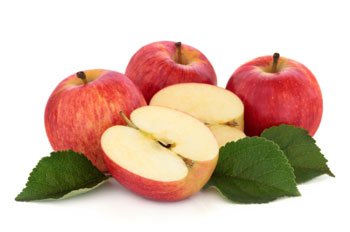Apples: Health benefits, facts, research
"An apple a day keeps the doctor away" is an old Welsh proverb that most of us are familiar with, but what makes this fruit so special? What health benefits are associated with eating apples?

Possible health benefits of apples
- Improving neurological health
- Reducing your risk of stroke
- Lowering levels of bad cholesterol
- Reducing your risk of diabetes
- Warding off breast cancer
Nutritional profile of apples
Apples deserve to be called "nutritional powerhouses". They contain the following important nutrients:
Vitamin C: Is a powerful natural antioxidant capable of blocking some of the damage caused by free radicals, as well as boosting the body's resistance against infectious agents, according to the University of Maryland Medical Center.
B-complex vitamins (riboflavin, thiamin, and vitamin B-6): These vitamins are key in maintaining red blood cells and the nervous system in good health.
Dietary fiber: The British National Health Service says that a diet high in fiber can help prevent the development of certain diseases and may help prevent the amount of bad cholesterol in your blood from rising.
Phytonutrients: Apples are rich in polyphenolic compounds". These phytonutrients help protect the body from the detrimental effects of free radicals.
Minerals such as calcium, potassium, and phosphorus are also found in the Apple fruits
Risks and precautions
No serious side effects are linked to apple consumption.
Apple seeds contain contain cyanide, a powerful poison. Eating too many apple seeds can potentially be fatal. Apple seeds should not be consumed.
In addition, because apples are fairly acidic, they could be up to four times more damaging to teeth than carbonated drinks, according to a study led by Professor David Bartlett at the King's Dental Institute.
Professor Bartlett said that "snacking on acidic foods throughout the day is the most damaging, whilst eating them at meal times is much safer. It's not what you eat it's how you eat it - an apple a day is good, but taking all day to eat the apple can damage teeth."
Serving tips
Wash apples thoroughly in the running water to remove any surface dust, insecticide/fungicide sprays. Trim off its top end using a paring knife, and cut the fruit into two halves. Take out tiny, centrally placed, bitter seeds. Slice the fruit into desirable cubes or slices. 
Here are some serving tips:
- Eat apple fruit "as it is" along with its peel to get maximum health-benefits.
- Sliced apple turns brown (enzymatic brownish discoloration) on exposure to air due to conversion in iron form from ferrous oxide to ferric oxide. If you have to serve them sliced, rinse slices in water added with few drops of fresh lemon .
- Cloudy as well as clear apple juice is a healthy alternative drink with dinner.
- Apple fruit is also used in the preparation of fruit jam, pie, and fruit salads.
Safety profile
Good yield demands close attention and supervision of apple fruit crop. According to the environmental working group reports, the apple fruit is one of the heavily pesticide-contaminated produces. The most common pesticides found in apples are organo-phosphorous and organochloride pesticides like Permethrin and DDT. Therefore, it is recommended to wash the fruit thoroughly before use.
Hi! I am a robot. I just upvoted you! I found similar content that readers might be interested in:
https://www.medicalnewstoday.com/articles/267290.php
Am so sorry. I forgot to add the source of information